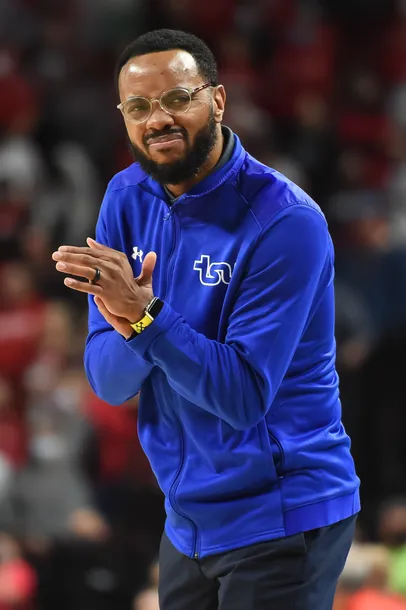title image via Goldenbullsports
Courtesy of Johnson C. Smith Athletics
The Central Intercollegiate Athletic Association (CIAA), the nation’s oldest historically Black athletic conference, is proud to announce the 2024 John B. McLendon Hall of Fame Class. The 2024 CIAA Hall of Fame Class is set to be enshrined on March 1, 2024. The enshrinement ceremony is slated to begin at 9:00a.m. EST at the Baltimore Convention Center Ballroom, in Baltimore, MD.
The event will be a part of the week-long schedule of events encompassing the 2024 CIAA Basketball Tournament, being held February 26-March 2 in Baltimore, Maryland. Ticket packages and information about the induction ceremony are available on the John B. McLendon CIAA Hall of Fame page at www.theciaa.com, also at https://ciaatournament.org.
The newest members of the CIAA Hall of Fame were chosen from a list of nominees who were submitted by their respective institutions and selected by the CIAA Hall of Fame Selection Committee.
The 2024 Hall of Fame Honorees includes Winston-Salem State’s Anthony Blaylock, Shaw’s Nastassia Boucicault, St. Augustine’s Antonio Pettigrew, North Carolina Central’s Norman Tate, and Livingstone’s Joseph “Jo Jo” White.
Bill Dusenberry | Johnson C. Smith | Football
Born with a natural talent for the sport, Dusenberry’s journey to success began at Dunbar High School, where he not only contributed to the team’s victory in the North Carolina State Championships but also showcased his skills in the 1966 Shrine Bowl during his senior season.
Dusenberry’s skills on the football field continued to flourish during his collegiate years at Johnson C. Smith University, where he played a pivotal role as the starting running back from 1966 to 1969. His exceptional abilities were recognized when he amassed an impressive 2,543 yards on 447 carries, scoring 23 touchdowns throughout his collegiate career. His outstanding collegiate career earned him the attention of professional football scouts and earned him All Conference Honors in 1969.
In 1970, his dedication and talent were acknowledged when he was drafted by the Houston Oilers in the 2nd round, being the 40th overall pick in the NFL draft. Although he began his professional career with the Oilers, Dusenberry was traded to the New Orleans Saints, where he displayed his skills during a memorable season. Following his time with the Saints, he spent time with the Edmonton Eskimos of the Canadian Football League in 1971 and later attended camps for the Toronto Argonauts (1972) and again with the Houston Oilers in 1973.
After his professional career, he moved to the Los Angeles area in 1975 and began a career with the Los Angeles Parks and Recreation Department that lasted 35 years before his retirement. He served as Senior Director and supervised numerous recreation facilities throughout the Los Angeles area.
James “Jimmy” Ewers | Johnson C. Smith | Men’s Tennis
James “Jimmy” Ewers, a distinguished former men’s tennis student-athlete, left his mark on JCSU history from 1966 to 1970. As a three-time CIAA Singles Champion in flights 3, 4, and 5 (1967-1969), he played a pivotal role in securing the 1969 CIAA team championship. Ewers reached the CIAA Finals in flight 2 in 1970, capping off an impressive collegiate career.
Throughout his four seasons, Ewers earned All-CIAA honors each year (1966-1970) and made history as the first African American to claim the NAIA District 26 Championship in 1969. His legacy extends to holding the JCSU record for the most consecutive matches won at an impressive 34.
Post-JCSU, Ewers remained actively involved in tennis, achieving singles titles in various leagues across the United States. He showcased his talents in regional and national tournaments, and his dedication to the sport continued as a tennis instructor for All-American Sports in New York City (1975-76). Ewers also embraced coaching roles, contributing to tennis programs at Baltou High School in Washington, D.C. (1972-74), the University of Maryland Eastern Shore (1979-83), and Paxon High School in Jacksonville, Fla. (2014-15).
His tennis journey includes participation in celebrity tournaments alongside iconic figures like Muhammad Ali, Frank Gifford, Earl Monroe, and John Amos. Ewers’s accomplishments have earned him well-deserved recognition, with memberships in the Atkins High School Hall of Fame, the Winston-Salem/Forsyth County Schools Athletics Hall of Fame, and the Johnson C. Smith University Athletics Hall of Fame.
About John B. McLendon, Jr.
John B. McLendon, Jr. was a true pioneer in the field of athletics with a long list of remarkable achievements. McLendon was hired by Cleveland State University in 1966, becoming the first African-American head basketball coach at a predominantly white institution. Today, there are more than 250 African-American coaches at predominantly white institutions. McLendon left his coaching post at CSU in 1969, but would later return to the university in 1991 as an athletics department advisor, a position he held until his death in October 1999. During that span, McLendon taught a course on the role of minorities in sports, “History of Sports and the Role of Minorities in its Development.”
McLendon is the person responsible for the integration of college basketball. Throughout the years, he was the head basketball coach at North Carolina Central College (1940-52), Hampton Institute (1952-54), Tennessee State University (1954-59), Kentucky State University (1963-66) and Cleveland State University (1966-69).
As successful McLendon was as a coach, his administrative responsibilities were equally as impressive. While serving as the basketball coach at North Carolina Central, McLendon was also the athletics director, a post he held for 12 years. At Hampton, he had additional positions as the assistant director of athletics and physical education. At Tennessee State, McLendon was appointed director of basketball operations from 1954-59 and director of the department of health, physical education, recreation and athletics from 1962-63. However, it was his service on the National Athletic Steering Committee, which McLendon founded in 1949, which had a large impact on the integration of basketball, and eventually, all sports. McLendon also served as director of international promotions for Converse Inc. from 1969-89.




